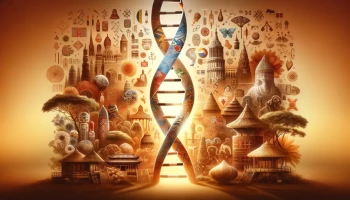In recent years, the curiosity about one's origins and the pursuit of personal health insights have converged into a single, groundbreaking avenue: DNA ancestry testing. This modern tool not only uncovers the intricate tapestry of our familial past but also offers a glimpse into the genetic predispositions that shape our health. Let's dive into the depths of how this technology works, the revelations it can bring, and its profound impact on our understanding of self and family.
The Evolution of DNA Ancestry Testing
The journey of DNA testing began as a scientific endeavor, primarily used in medical research and forensic science. However, its leap into the consumer market has transformed it into a beacon of personal discovery. Unlike traditional genealogical methods that rely on historical records and oral histories, DNA testing delves into the biological roots that lie within our genetic code.These tests examine specific segments of DNA, comparing them against vast databases of genetic information from populations around the world. This comparison can reveal ethnic percentages, trace migration patterns of ancestors, and identify genetic relatives. The process is straightforward yet profound: by submitting a small saliva sample, individuals can unlock stories woven into their DNA strands, waiting to be told.
Deep Dives into Ethnic Origins and Historical Migrations
One of the most captivating outcomes of ancestry DNA testing is the detailed ethnic breakdown it provides. Users often discover a mosaic of ethnicities within their genetic makeup, sometimes confirming family lore, other times rewriting histories believed for generations. This newfound ethnic clarity can inspire deeper connections to ancestral lands and cultures, urging individuals to explore languages, traditions, and histories previously unknown to them.Moreover, these tests can illuminate the migration paths ancestors took, painting a dynamic picture of movement and settlement over centuries. They offer a unique lens through which to view the historical events and societal shifts that led families across continents, intertwining destinies and cultures.
Building Bridges: Connecting with Relatives and Ancestral Communities
Beyond the allure of ethnic percentages, DNA testing has the remarkable ability to connect living relatives. By matching shared genetic segments, these tests can identify cousins, siblings, and more distant relatives, weaving together fragmented family trees. For many, this leads to heartwarming reunions, the filling of gaps in family histories, and the healing of old wounds. For adoptees and those with unknown parentage, these connections can be especially poignant, offering answers and a sense of belonging long sought after.
A New Frontier: Health Insights Through Genetic Predispositions
While the exploration of ancestry remains a significant draw, DNA testing has expanded its horizons to include health-related insights. By analyzing genetic variants, these tests can inform individuals of their predisposition to certain health conditions, such as cardiovascular diseases, certain cancers, and genetic disorders. This information is not a diagnosis but a foresight, offering a chance for preventative measures and informed lifestyle choices.Moreover, DNA tests can reveal carrier status for various conditions, crucial information for family planning and understanding hereditary risks. These health insights encourage proactive engagement with healthcare providers, leading to personalized health strategies and a greater understanding of one's bodily inheritance.
Ethical Considerations and Privacy Concerns
As we embrace the wealth of information DNA testing provides, we also face ethical and privacy considerations. The handling of genetic data, consent for its use, and the implications of uncovering unexpected family secrets or health risks require careful navigation. Users must consider the privacy policies of DNA testing companies, the potential impact of their findings, and the sharing of sensitive genetic information.
The Ripple Effect: Transforming Personal Identity and Family Narratives
The consequences of DNA testing extend beyond the initial excitement of uncovering ancestral origins or potential health risks. They can profoundly affect one's sense of identity, challenging and enriching it. The revelations can redefine family narratives, strengthen cultural ties, and foster a sense of global connectedness.In families, these discoveries can prompt conversations about heritage, health, and shared histories. They can bridge generations, as stories and experiences are passed down, grounded in the newfound concrete evidence of DNA.






